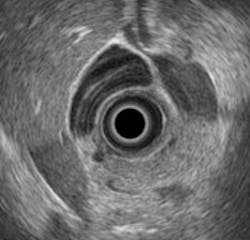Analyzing ultrasound helps diagnose cancerous tissue
An assistant professor of physics at Kettering University (Flint, MI, USA) is seeking a better way to diagnose between chronic pancreatitis and pancreatic cancer by analyzing endoscopic ultrasound images.
"The clinical problem is how to determine if the symptoms are cancer or a chronic condition that can be treated and managed," says Dr. Kumon.
Traditionally, doctors have mainly used the images from ultrasound systems in a qualitative way, looking at the shape, color, and pattern of the imaged organs to make their diagnosis.
Kumon and his collaborators, however, are working to quantitatively analyze the radio frequency data that underlies the ultrasound images to try to distinguish malignant from benign tissue states.
"If we can achieve high enough reliability and accuracy with our ultrasound test, then we could reduce the need for surgical testing or allow the malignancy to be monitored during treatment," he explains.
His studies to date show that a spectral analysis of the backscattered signals obtained by using electronic array echoendoscopes can provide a noninvasive method to quantitatively discriminate between chronic pancreatitis and pancreatic cancer.
More details on Dr. Kumon's work can be found in the technical paper "Characterization of pancreas in vivo using endoscopic ultrasound spectrum analysis with electronic-array echoendoscopes."
Recent articles on ultrasound imaging from Vision Systems Design.
1. 3-D ultrasound software company spins out of Oxford
University of Oxford (Oxford, UK) spin-out Intelligent Ultrasound (Oxford, UK) has raised £610,000 to develop software that can reduce the risk of incorrect or missed diagnoses from ultrasound scans and avoid costly, inconvenient rescans.
2. Ultrasound probe to monitor the vision of astronauts
Scientists at GE Global Research (Niskayuna, NY, USA) are involved in a three-year project to build and test a new ultrasound probe that could eventually be used to monitor how spaceflight affects the vision of astronauts.
3. Ultrasound propels nondestructive testing
Researchers at the Fraunhofer Institute for Industrial Mathematics (ITWM; Kaiserslautern, Germany) have now developed a mobile mechanized ultrasound system that can be used for the nondestructive testing of complex components.
-- Dave Wilson, Senior Editor, Vision Systems Design
